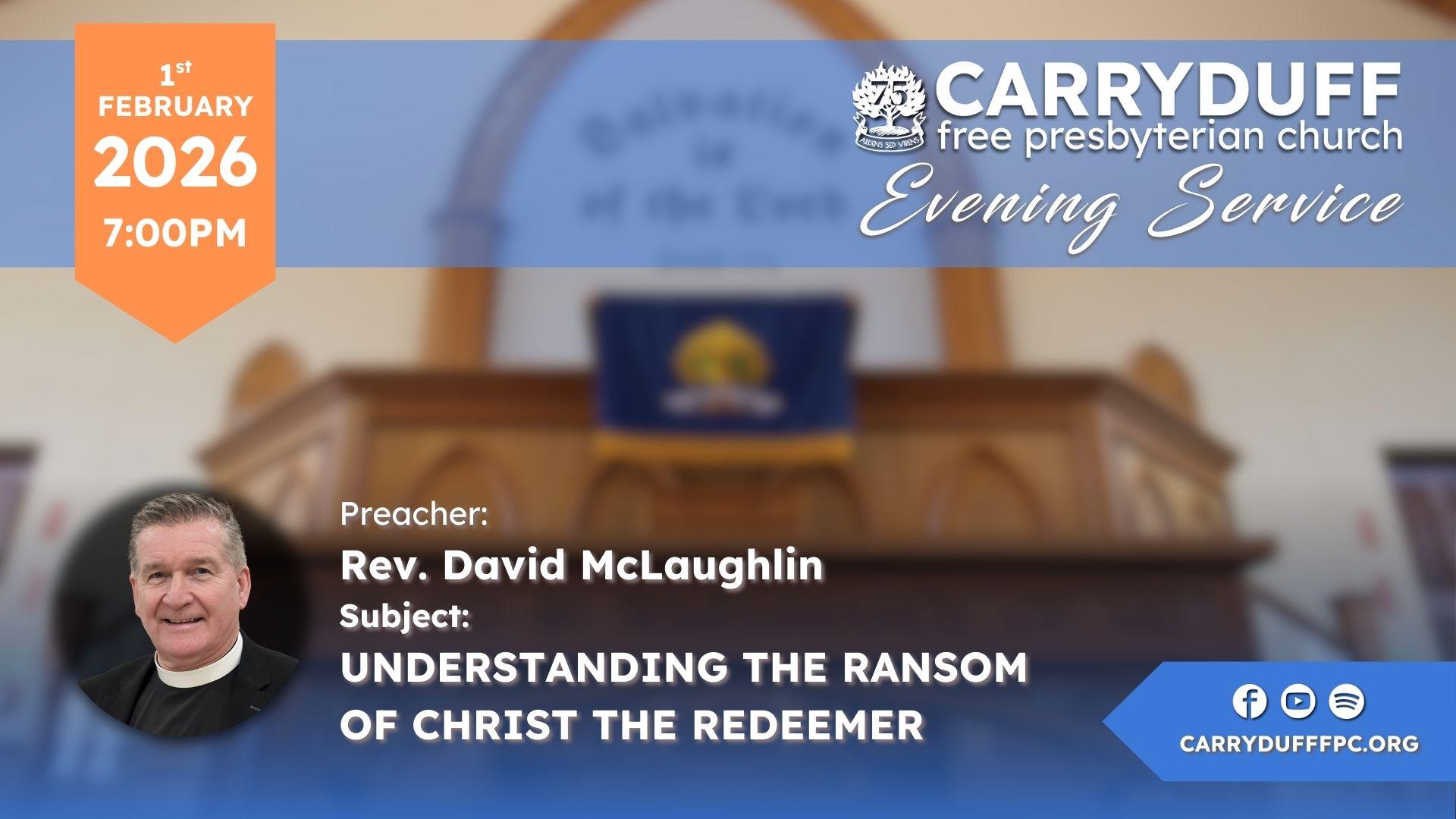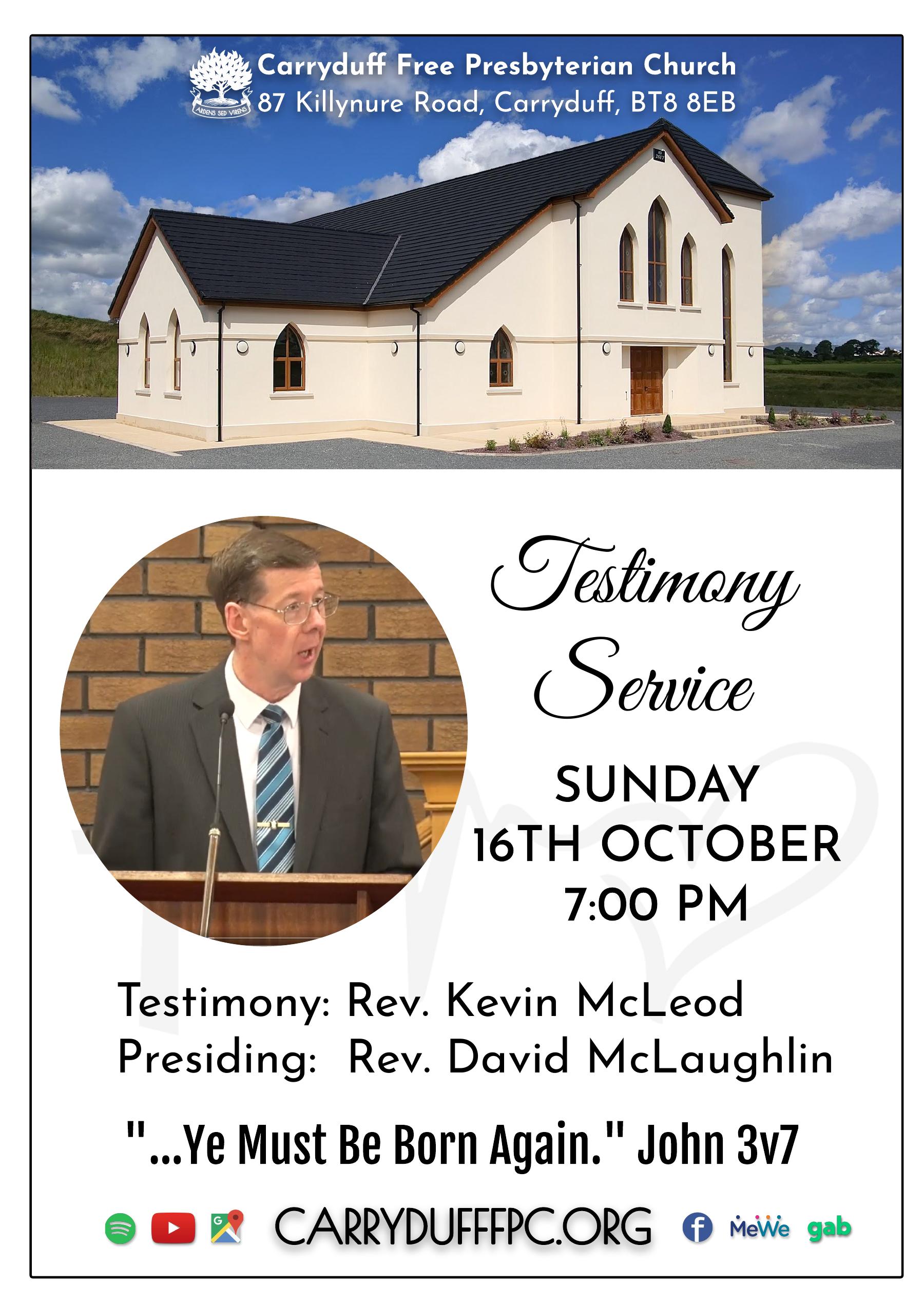Date: SUN 7:00pm 31st August 2025
Preacher: Rev. David McLaughlin
Bible Reference: Job 33:24
Then he is gracious unto him, and saith, Deliver him from going down to the pit: I have found a ransom.
Sermon Summary: The Remarkable Ransom (Job 33:14–30, Evening Service)
Text: Job 33:24 – “Then he is gracious unto him, and saith, Deliver him from going down to the pit: I have found a ransom.”
Title: The Remarkable Ransom
Introduction
The sermon, delivered during an evening service, focuses on a passage from the Book of Job, specifically Job 33:14–30, with emphasis on verse 24. The preacher expresses fascination with the Book of Job, noting its depth and referencing a historical preacher who spent 13 years expounding it. The passage is read from the Authorised Version, and the sermon explores the theme of divine deliverance through a ransom, presented as a message of hope and salvation.
Context of Job
The sermon introduces Job as a godly, upright man from the land of Uz, described in Job 1:1 as perfect, upright, God-fearing, and one who eschewed evil. Despite his righteousness, Job faced catastrophic trials:
- Losses: In one day, Job lost his ten children to a violent wind, his animals were stolen, and all but one of his servants were murdered by the Chaldeans (Job 1–2).
- Personal Suffering: Job’s wife, in despair, urged him to “curse God and die,” and Job was afflicted with painful boils from head to toe (Job 2:7–8).
- Emotional and Social Devastation: Job, once a prominent and powerful man of the East, was reduced to a state of physical and mental brokenness, sitting in silence with his three friends—Eliphaz, Bildad, and Zophar—for seven days and nights due to the immensity of his grief.
The Role of Job’s Friends
Job’s three friends initially came to comfort him but soon turned to accusing him of secret or serious sin, arguing that his suffering was divine punishment. The preacher cautions against such hasty judgment, urging prayerfulness and restraint when others face calamity, as the full circumstances are often unknown. Later, a younger friend, Elihu, enters the discussion (Job 32). While Elihu speaks truthfully about God’s sovereignty and grace, he also mistakenly accuses Job of self-justification, though he refrains from outright judgment.
Main Points of the Sermon
The sermon is structured around three key points drawn from Job 33:24, exploring the concept of a “ransom” as a means of divine deliverance.
- The Danger Faced: Going Down to the Pit
- The phrase “going down to the pit” is highlighted as a metaphor for a path leading to destruction, not merely physical death but eternal separation from God in hell.
- The “pit” is referenced three times in the passage (verses 18, 24, 30), symbolising a place of terror, torment, outer darkness, and eternal suffering, as described in Luke 16 (the parable of the rich man and Lazarus) and Numbers 16 (Korah’s rebellion, where rebels were swallowed alive into the pit).
- The preacher warns that many in society—despite enjoying God’s provision of breath, health, and material blessings—are on a trajectory toward this pit due to pride, rebellion, and rejection of God.
- Hell is presented as a real, eternal place of torment for the unsaved, including not only murderers and thieves but also the unbelieving and those who forget God (Psalm 9:17). The sermon references the 50th anniversary of a tragic murder of five Orange brethren in County Armagh (1 September 1975) to underscore the consequences of sin.
- The urgency of the danger is emphasised, with the reminder that death is but a step away (1 Samuel 20:3) and that individuals are a breath away from eternity.
- The Discovery Found: A Ransom
- The sermon highlights the gracious intervention of God, who declares, “Deliver him from going down to the pit: I have found a ransom.” The Hebrew word for “ransom” (kofar) means atonement, signifying redemption, release, and rejoicing.
- This ransom is identified as Jesus Christ, the mediator of the new covenant and merciful high priest, who paid the price for humanity’s sin through His sinless life and atoning death (Matthew 20:28).
- The preacher stresses that salvation is not found in religious institutions (neither Catholic nor Protestant), moral living, or rituals, but solely in Christ’s shed blood, which satisfies divine justice and appeases God’s wrath.
- A story about Dr. Torrey and a repentant drunkard shoemaker illustrates the transformative power of the gospel, which offers salvation freely to sinners without merit, as seen in Isaiah 55:1 (“come ye, buy, and eat… without money and without price”).
- The discovery of the ransom is presented as God’s gracious solution to human sinfulness, enabling Him to be both just and the justifier of the ungodly (Romans 3:26).
- The Deliverance Focused: A Personal and Powerful Call
- The deliverance is personal (“Deliver him”), underscoring individual accountability for sin and the need for personal repentance and faith.
- It is powerful, as it rescues from imminent danger, with the urgency of “now is the accepted time; now is the day of salvation” (2 Corinthians 6:2).
- It is particular, requiring a confession of sin (Job 33:27–28) and a turning to God, as exemplified by Zacchaeus and the lame man in the Gospels.
- The result of this deliverance is conversion, restoration, and rejoicing in God’s salvation, with the promise that the redeemed “shall see the light” and enjoy a restored relationship with God.
- The sermon closes with a call to the congregation to examine whether they have experienced this personal deliverance, urging them to confess their sins, repent, and trust in Christ to avoid the pit and receive eternal life.
Conclusion
The preacher concludes by reiterating the solemnity of the danger (the pit), the hope of the discovery (the ransom in Christ), and the urgency of the deliverance (a personal response to the gospel). He encourages the congregation to ensure they have experienced this transformative salvation, warning that without it, they remain in peril of eternal judgment. The sermon ends with a prayer that God will use His Word to convict and save, thanking the congregation for their attendance and attentiveness.
Tone and Style
The sermon is delivered in a solemn, urgent, and pastoral tone, blending scriptural exposition with vivid illustrations and contemporary applications. The preacher uses repetition, rhetorical questions, and biblical cross-references to reinforce the gravity of sin, the reality of hell, and the grace of God’s salvation through Christ. The message is both a warning to the unsaved and an encouragement to believers to rejoice in their deliverance.
Subscribe to the podcast here:
Spotify Podcasts | Apple Podcasts | Pocket Casts
Email | RSS | more information here








